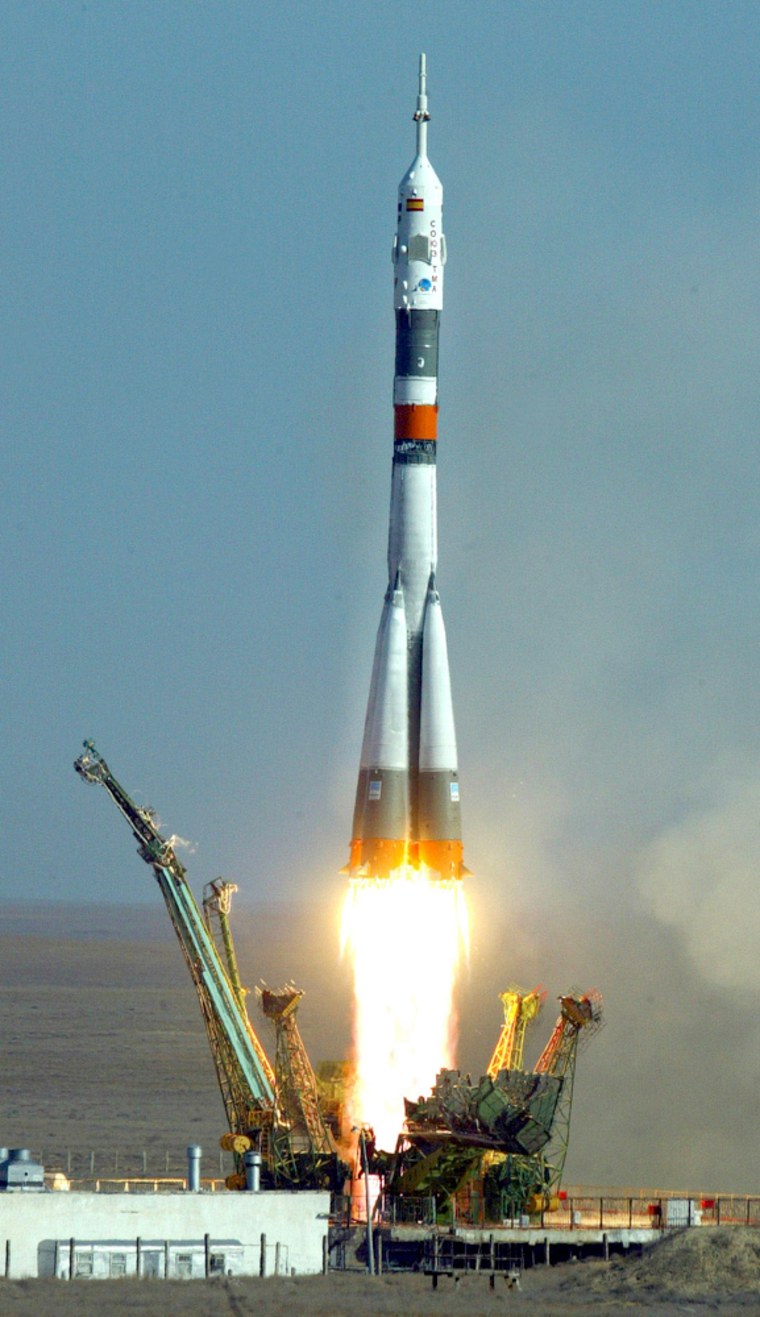The pre-election shakeup of the Russian government extended into space last week, with Russian President Vladimir Putin appointing Col. Gen. Anatoly Perminov to head a streamlined space agency. The surprise move has NASA officials privately expressing concern, worried about the impact on U.S.-Russian space relations, already under strain due to the grounding of the U.S. space shuttle fleet.
Until NASA's shuttles resume flying next year at the earliest, all crews and supplies are being transported to the international space station aboard Russian spacecraft. And if the station crew is ever to reach the long-promised level of six people, the Russians will have to double their launch rate –- although who is going to pay for this has remained a contentious topic during recent negotiations. Perminov may meet NASA Administrator Sean O’Keefe as early as April 1, during a previously scheduled visit to the United States.
Perminov is replacing Yuriy Koptev, the current head of the space group. While rumors of Koptev's retirement had circulated in Moscow late last year, his successor at the time was expected to be the agency’s first deputy director, Nikolay Moiseyev.
Commenting on the move, veteran space journalist Konstantin Lantratov wrote in Friday’s "Kommersant-Daily": “The long-running dispute between the representatives of the civilian and military space exploration establishments as to who could make better use of available resources and develop the near-Earth space, has been resolved in favor of the latter,"
Koptev was the first and to date the only head of the Russian Space Agency, a bureaucratic organization set up in post-Soviet Moscow to be the functional equivalent of the American space agency, NASA. The then NASA Administrator Daniel Goldin played a key role in Koptev’s acquisition of power over semi-independent space organizations in Russia, such as the Energia Space and Missile Organization that actually built and flew human space vehicles. Once Koptev took control of the flow of cash from foreign partners and from the federal government, he emerged as winner in a power struggle with his rival Yuriy Semyonov of Energia.
NASA frets
A day after the announcement, Albert Condes, NASA’s newly-named deputy assistant administrator for external relations, circulated an internal memo commenting on what the changes meant for NASA.
“It is likely that there will be additional fall-out for our relationship besides a change in the name and leadership of the agency,” Condes writes in the memo, which MSNBC.com obtained a copy of. “While it is too early to tell what may come, it is clear that General Perminov is much less wedded to the human space flight program than Mr. Koptev.”
Negotiations regarding who will pay for what aboard the re-directed space station may also become more difficult, Condes warned. “Based on his reported comments as Commander of the Russian Space Forces, [he] is likely to take a more nationalistic perspective on Russia's space program. ... The specific implications of this for current programs of cooperation should become more clear in the coming weeks.”
Of specific interest to NASA, continued Condes, “there are significant changes regarding Rosaviakosmos.” It will “no longer be a separate operating agency under the purview of Deputy Prime Minister”, but is now to be subordinated to the Ministry of Industry and Energy. Furthermore, “Rosaviakosmos also lost the aviation part of its portfolio” –- in recent years it had also been in charge of Russia’s aviation industry, whose budget dwarfed the funding allocated to space activities.
Military to the core
Perminov, 58, had been a missile officer since 1967, rising to the post of commander of Plesetsk space center north of Moscow. He served there from 1991 to 1993, and then in a variety of staff positions at Strategic Rocket Forces headquarters. In 2001 he was appointed to head the newly independent Russian Space Forces, responsible for military satellites, space tracking and communications, missile attack warning, and anti-missile combat units around Moscow.
“There is a long history of bureaucratic conflict between the missileers and the folks who did other space-related duties in the Strategic Rocket Forces," Condes noted in his memo.
The establishment of the space force, according to an article Perminov wrote for the Russian army daily "Red Star" in 2002, “was necessitated by international trends toward the expansion of the role of space in providing protection for vitally important state interests in the economic, political, and military spheres.” He added that “the entire world” considered the use of space to be one of the main components of national security.
“Only two countries, Russia and the United States, are capable of controlling space,” he told a Novosti reporter the following day. He described his main task as rebuilding the orbital groupings of Russian military satellites, and moving all military space launchings from the Baykonur cosmodrome in Kazakhstan to sites within Russia. He also gave high priority to upgrading Russia’s anti-missile defense system, which “will become the basis for the protection of Russia’s national interests –- and that is why its consistent modernization is planned.”
In April 2003, Perminov had told a Russian journalist that carrying out his plans for developing the Space Forces was going to help Russia "retain the status of a great space power and maintain the balance of forces" in the world.
Perminov is not the first military flag officer to head a national space agency. U.S. Navy Vice Admiral Richard Truly ran NASA from 1989 to 1992. However, he had spent most of the previous quarter century as an astronaut, with few recent responsibilities in military space and missile activities.
